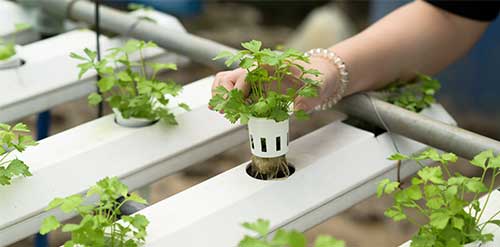Hyundai Motorstudio Senayan Park
Hyundai Motorstudio Senayan Park
Newsroom
The official news from Hyundai Motorstudio Senayan Park and a collection of innovative articles on mobility and sustainability here.
-
What is Hydroponics? The system, how it works and the benefits
- Hyundai Motorstudio Senayan Park 2022.07.06
-
Many people want to know what hydroponics is. Basically, hydroponics is the art of gardening without soil . Taken from the Latin, hydroponics means working water. So, even without soil media, water will provide nutrients and oxygen for plants.
Therefore, from watermelons to orchids, hydroponic plants continue to thrive and thrive. Before discussing further, let's get to know more about what hydroponics is and how it works, and the following benefits!
What is Hydroponics?
Hydroponics is a method of cultivating plants without using soil. Plant seeds are planted in a growing medium equipped with a solution rich in nutrients, oxygen and water. This system promotes fast, high-quality plant growth.
In contrast to conventional plant cultivation systems, hydroponics provides plant nutrients in the growing media. If a plant's root system is exposed to water and nutrients directly, the plant will quickly grow and develop. This is because the energy released by roots to find food and water can be diverted for plant growth. As a result, plant growth is faster and bigger.
How does a hydroponic system or system work?
Hydroponic systems work by providing oxygen, temperature, environment, and pH balance to maximize nutrients and water for plants. The working principle of hydroponics is very simple, which is to provide plants with what they need at all times. Hydroponics provides nutrient solutions based on plant needs.
This is very different from plants that grow in nature or a free environment. There is a risk of the plant being exposed to fungus, pests or being eaten by insects. Meanwhile, hydroponics provides an environment and temperature balance for plants.
So, even without soil media, seedlings can grow and mature faster. Without the use of pesticides, hydroponics is able to produce fruit and vegetables that are healthier and of higher quality.
What are the Benefits of Hydroponics?
Actually there are many advantages of hydroponic plant cultivation. Here are some of them:
1. Small Land
vertical garden techniques . In addition, the roots of hydroponic plants do not spread in search of nutrients and water. This means, there will be fewer plant roots and will not require large space or land.
2. Save Water
People rarely know that hydroponic cultivation actually uses less water than ordinary farming methods. In fact, hydroponic plants can grow with up to 98% less water than traditional growing methods. Hydroponic plant roots only take up 0.1% of water, most of the water is released into the air by evapotranspiration . In other words, after absorbing water, the hydroponic plant will release it back into the system.
3. Not Affected by Climate
It should be understood that hydroponic plants are not too dependent on climate change . Because, hydroponic plants can be cultivated indoors or outdoors, regardless of whether they don't get sunlight, cultivators can use lamps or artificial light instead of light.
4. Quality Harvest
Hydroponic plants receive balanced nutrition and are in direct contact with the roots. That is why plants are superior and harvest faster. In fact, compared to traditional farming, hydroponic crops are able to produce 240 times more yields.
5. Less Manpower
Without the need to cultivate the soil, weed, and spray pesticides, hydroponic farming can save more on manual labor. Thus, reducing production costs and labor costs for agriculture.
6. Without Soil Media
As the polar ice caps melt, sea levels rise and remove 50% of the land. What does it mean? Planet Earth is getting more and more agricultural land crises. In addition, there are several types of plants that are only suitable for planting in certain soil conditions. Therefore, hydroponics can be a solution. Cultivation can run smoothly without soil media and not worry about environmental damage.
7. High Quality Results
It's no secret that traditional agriculture sometimes has to harvest the results faster because it meets the supply chain and distribution of consumers in distant places. In fact, eating naturally ripe fruit or vegetables is far more nutritious and tastier.
Hydroponic gardens have their own microbiome and can be planted anywhere. In fact, restaurants or cafes can cultivate their own hydroponic vegetables or fruit to be processed.
8. Reducing the Supply Chain
In conventional agriculture, the harvested vegetables or fruit will be transported using logistics cars to main markets. During the distribution process, it requires fuel costs, as well as facilities such as box cars with cooler boxes. In fact, it's possible that vegetables and fruit are chemically preserved. However, if you use hydroponic cultivation, it can be planted anywhere.
This further simplifies the supply chain and distribution system. The results of hydroponic gardens can also be accepted by consumers in fresh conditions because they are grown in the local area.
9. Predictable Prices
As is known, vegetables and fruit that are in harvest season with abundant stocks are generally cheaper. This fact makes farmers lose money and it is difficult to predict prices. However, with hydroponic cultivation, farmers can grow vegetables throughout the year regardless of weather and climate. Farmers can also enter into long-term, profitable fixed-price contracts.
10. Plants Grow Faster
Most crops on traditional farms take several months to mature and be ready to harvest. Meanwhile, the growth rate of hydroponic plants can be 30-50% faster. The reason is that nutrients are more easily absorbed by hydroponic plants.
Cultivators could regulate light, temperature, nutrients, oxygen, and all other aspects. This means the cycle can be simplified for certain types of plants so that they can ripen faster with superior yields.
That's the discussion this time about what is hydroponics, how it works, and some of its benefits. Seeing the convenience and advantages, are you interested in trying hydroponic plant cultivation? Don't hesitate to try it!




